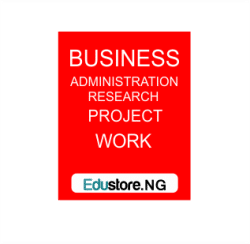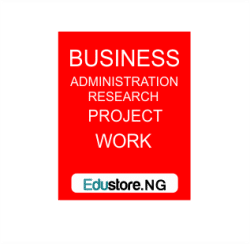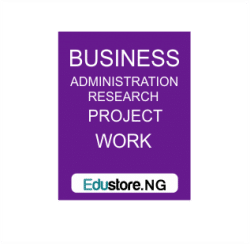ABSTRACT
In spite of the numerous sales promotion techniques available to many organizations many organizations have not yet appreciated how to effectively and efficiently utilize these sales promotion techniques in attempting to enhance their organization performance. The objective of this work is to examine the impact of sales promotion in a business organization with special reference to Nigeria bottling Company Plc. The study adopted a descriptive research design. The population of the study was estimated at 865 (management, staff and key distributors) out of which a sample of 160 was used (primary data). The main sources of data were secondary and primary. Questionnaires were used to collect primary data whilst secondary data was taken from financial statements of NBC from 1985 to 2014. STATA 13 was used for the analyses. The study recommends that management of NBC involves key distributors and supply chain members in sales promotional activities. Management of NBC also needs to integrate all promotional tools to ensure that all promotional goals are achieved.
CHAPTER ONE
INTRODUCTION
1.1 Background of the study
The growing managerial importance of sales promotion has generated a great deal of research on how sales promotion affects profitability (Loudon and Bitta, 2002; Perreault and McCarty, 2002; Schiffman and Kanuk, 2004). There is no doubt sales promotions have become a vital tool for marketers and its importance has increased significantly over the past 2 decades. In Nigeria, sales promotions expenditures by various companies is estimated to be in thousands of Nigeria naira and the emphasis on sales promotion activities by the various industry players continue to increase year on year (Hinson, 2005). Sales promotion is an initiative undertaken by organizations to promote sales, usage or trial of a product or service (i.e initiations that are not covered by other elements of the marketing communication/promotional mix). It is an important component of an organization’s overall marketing strategy along with advertising, public relations, and personal selling (Schiffman and Kanuk, 2004). Sale promotion acts as a competitive weapon by providing an extra incentive for the target audience to purchase or support one brand over another. It is particularly effective in spurring product trial and unplanned purchases (Aderemi, 2003).
As presented by Achumba (2002), sales promotion refers to marketing activities, other than personal selling, advertising and publicity that stimulate consumer purchasing and dealer effectiveness, such as displays, shows and expositions, demonstration etc. Sales promotion has been defined as a direct inducement that offers an extra value or incentive for the product to the sales force, distributors or the ultimate consumer with the primary objective of creating an immediate sale (George, 1998). Elsewhere, Strang (2006) reviewed major trends in the management of sales promotion in a sample of U.S. package goods companies. He documented the shift of funds from advertising to sales promotion budgets. However, the author did not explore specific promotions nor specific success factors associated with promotions. Analyzing Nielsen data, Peckham (1998) observed thousands of individual promotions. He concluded that sales promotions are most effective in stimulating sales during the introductory and growth phases of the brand’s life cycle. Peckham further asserted that sales promotions frequently mortgaged the brand’s future sales and he doubted the profitability of many sales promotions. Similarly, Lembeck (1999) found that only 40% of sales promotions are effective but there was no definition of success or effectiveness. Other studies suggest that sales promotions do not have a constant or continued effect on volume of sales of a firm which tend to diminish and come at the initial level at which it was before the sales promotion is being offered (Dekimpe et al. 1999; Pauwels et al. 2002; Srinivasan et al. 2000). Still some researchers argue about the usefulness of sales promotion, that whether it promotes the long term growth and profitability among brands for which it is projected is not compulsory (Kopalle, Mela and Marsh, 1999). In contrast, a study conducted by Ailawadi and Neslin (1998) revealed that sales promotions motivate the consumers to make immediate purchases and also positively impacts the consumption volume. In the midst of the above controversies, this research sought to examine the effect of sales promotion on organisational profitability using Nigeria Bottling Company (NBC) as case study.
1.2 Problem statement
Although several sales promotions are conducted each year by bottling companies, promotion managers are frequently confronted with the challenge of defending the question of the impact of sales promotions activities on the profitability of the firm. A review of literature also shows that much of the previous research in sales promotion has focused on the consumer or retail trade response to promotions but has not incorporated the effect of sales promotion on profitability (Kopalle, Mela and Marsh, 1999; Ailawadi and Neslin, 1998; Dekimpe et al. 1999; Pauwels et al. 2002). For instance, Lembeck (1999) suggested that only 40% of trade promotions are effective but there was no definition of success or effectiveness. In line with the above, this study sought to examine the effect of sales promotion on the profitability of Nigeria bottling company plc.
1.3 Objectives of the study
This study generally sought to examine the effect of sales promotion on the profitability of Nigeria bottling company plc. The specific objectives entail:
- To examine sales promotional activities used by Nigeria bottling company plc.
- To examine the relationship between sales promotion and financial performance of NBC.
- To examine the effect of sales promotion on non-financial performance of
- To identify challenges surrounding sales promotion activities undertaken by NBC
1.4 Research Question
The following research questions shall be investigated:
- What sales promotional tools are used by Nigeria bottling company plc?
- What is the relationship between sales promotion and financial performance of NBC?
- What is the effect of sales promotion on non-financial performance of NBC?
- What challenges affect sales promotional activities undertaken by NBC?
1.5 Research Scope
This study covers sales promotion activities within the operations of NBC over the past 30years (1985 – 2014). Specifically, the study looked at the relationship between sales promotion and sales performance of NBC as well as its on profitability. The research also explored the non- financial benefits of sales promotional activities to NBC brands. This study covers management key distributors and staff of Nigeria bottling company plc. Both primary and secondary data were harnessed. This is because sales figures could be retrieved from sales reports and financial statements whilst the effectiveness of sales promotion could be assessed from management and staff perspectives.
1.6 Significance of the study
This study is significant in three respects. First is its contribution to the brewery industry; as presented in the background statement, many managers particularly those with less appreciation for marketing continue to challenge the excessive budget expenditures in the area of sales promotion. This study is expected to engender further discussion and probably provide some answers regarding the effect of sales promotion on firm profitability. The findings will provide a solid reference point for many marketing managers to defend allocations made to sales promotion activities. The contribution of this study to the economy though arguable can be seen in the adoption of promotional tools that create value for customers. Since the primary objective of every sales promotion to influence sales and trial of new products, it is expected that increased sales will trickle down into profits “ceteris paribus”. By extension, government generates revenues from taxation. The contribution of this study to academia is also not in doubt as it provides a good premise for future research. It also adds to existing literature on sales promotion and its effects on firm profitability.
DOWNLOAD COMPLETE WORK- For Reference Only: Materials are for research, citation, and idea generation purposes and not for submission as your original final year project work.
- Avoid Plagiarism: Do not copy or submit this content as your own project. Doing so may result in academic consequences.
- Use as a Framework: This complete project research material should guide the development of your own final year project work.
- Academic Access: This platform is designed to reduce the stress of visiting school libraries by providing easy access to research materials.
- Institutional Support: Tertiary institutions encourage the review of previous academic works such as journals and theses.
- Open Education: The site is maintained through paid subscriptions to continue offering open access educational resources.






